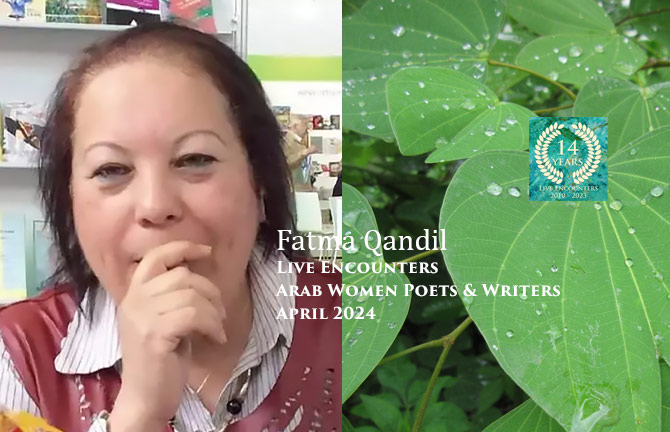
Live Encounters Arab Women Poets & Writers April 2024.
Spiky voids that move suddenly, poem by Fatima Qandil.
Translated from Arabic by Dr. Salwa Gouda.
Spiky voids that move suddenly
Keys that open doors
Are the keys that close doors
And the keys hanged in chains
Only has the drama of resonance
But the key that dies in my pocket
Reminds me that it’s time
To be a sensible woman
That lives in a house
Without keys… without doors…
*****
A shooting star is hiding
Before we see its features
Before we knew that
It is the same shooting star.
Everything I saw in my heart after that
Is a sunken feet
Then the blood prevented traces.
*****
How I loved a man like a black star
Who stripped me of all the men I loved
And he leaves me only
The joy of orphanhood.
*****
Darkness eats the full moon
Then it rises trembling
The scythe of defeat.
*****
Why do you imagine the family scene
As water falls on the sides of the tractor?
*****
I say, Ziad, I am your mother
And you will not be
I say, Ziad: My uterus is in fragments
How can I settle you?
*****
Every day
In metro expressway
A dilapidated house flashes
With an external wooden ladder
And an iron door
Always open
every day
Until it became my home.
© Fatima Qandil
Fatima Qandil (1958) is an Egyptian poet, writer, and academic. She has published many poetry collections, and one of her most prominent works is the novel Empty Cages, which won the Naguib Mahfouz Prize for Literature in 2022.
Translation by Dr. Salwa Gouda, an Egyptian literary translator, critic, and academic at the English Language and Literature Department at Ain-Shams University. She holds a PhD in English literature and criticism. She received her education at Ain-Shams University and California State University in San Bernardino. She has published several academic books, including “Lectures in English Poetry, and “Introduction to Modern Literary Criticism” and others. She has also contributed to the translation of “The Arab Encyclopedia for Pioneers,” which includes poets and their poetry, philosophers, historians, and men of letters, under the supervision of UNESCO. Additionally, her poetry translations have been published in various international magazines.

